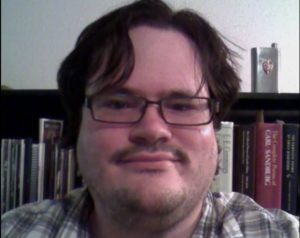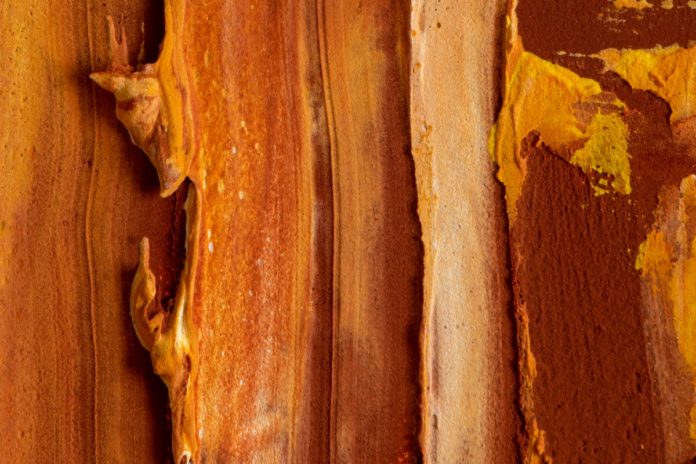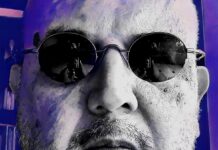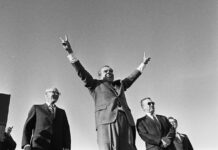Poets often reflect that poetry emerges from the character of the poet. As Americans are awash in the forces of contemporary life, there is little time for self realization or pure reflection. Some poets, such as Frank Bidart, protest the condition of postmodern life by creating an anti-aesthetics. Narcissism is not defined by Freud as morbid self interest but is more a condition of losing oneself within a flux of world, a kind of drowning where one emphasizes oneself because one has lost oneself. In The Divided Self, R.D. Laing discusses the phenomenon of engulfment, “The individual experiences himself as a man who is only saving himself from drowning by the most constant, strenuous, desperate activity.” He describes isolation as the main maneuver against engulfment. That explains the contemporary American soul within the context of commercialism and bureaucracy. Narcissism is an infantile state of dependency on the object of desire, rather than recognizing oneself as framed within space-time and part of a continuum.
St. Augustine writes in The City of God, “One city is that of men who live according to the flesh. The other is of men who live according to the spirit. Each of them chooses its own kind of peace and, when they attain what they desire, each lives in the peace of their own choosing.” The spirit is defined in contradistinction to human matters. It is beyond physical man, and instead in accordance with God. God is described by multiple definitions such as Ultimate Reality, Truth, Pure Ideality, and Form. Plato’s cave allegory serves to symbolically testify to the mysterious quality of language to define that which we cannot see. Lacanian psychoanalysis relates that the unconscious is structured like language. The signifier splits phonetically from one mental image to another through metaphor. Experience is recorded in dimensions of language. One structure is imposed on the other as if recorded, and interpreted to align with one’s desire (or lack). The gap between the small Other and the field of the Other is analogous to primary and secondary narcissism. However, for Lacan language is structured around differentials. The Object is beyond grasp, therefore the multiplicity of perspectives are natural and inevitable.
Two cities exist within Humankind. One is of the Spirit and the other is the Flesh. Poetry navigates these two oppositional poles. Prosperio Saiz writes, “I will not serve the twin poles of being.” In defiance, he indicates a sense of urgent rejection of the entire psychic order as if it is imposed on him. Poetry invokes a wholeness and restoration of the Eternal through navigating the grids inferred by polarity. Because “there is no such thing as woman” (Lacan) gaps must exist between desire and language.
However, contemporary evolutionary biology insists that language is indeed biological and related to vision. Narrative is then assumed by space and distance in the same sense that General Relativity instructs students that velocity is relative to one’s position. For my purpose, velocity metaphorically signifies communication between small worlds and large worlds that emerge from inner networks.
In Frank Bidart’s postconfessional poetics, the poet engages in process. Writes critic Carol Moldaw in “Frank Bidart: The Substance of the Invisible”, “The shape of the poem, then, is the shape of the something pre-existing, though it needs the poem to reveal itself.” In Bidart’s work we come to recognize that God is among us and that the two cities of St. Augustine are in fact coexistent.
“In an effort to write an apparently content-oriented poetry in a time when we view language as constitutive, Bidart’s approach is anti-aesthetic” , writes Jeffrey Gray in “Necessary Thought: Bidart and the postconfessional.” The poetry of Lisa Marie Basile envisions the constitutive dynamic as interpersonal in Apocryphal. The power dynamics between the confessional narrator and her symbolic Other reveal a hidden ergonomic. The narrator’s inner world is adroitly honest in its parallax and punishment. In Andalucia, we are met with depth psychology—the family is underwater and horses bleed fire into the ravine. These symbolic sexual presences undermine the narrator’s integrity in the sense that they situate a carnivalesque preverbal hideousness. The underwater situation represents containment of the id function by the ego. In Basile’s dream image, she is lost to herself. Instead, the collective unconscious presents itself. The sorcery is in making oneself invisible to oneself. Basile’s narrator plays peek-a-boo throughout.
Godel’s Incompleteness Theorems prove that if the logic within a system is consistent, it must rely on another system to prove its completeness. The mental and physical language structures then act as self-evident if they are consistent. For the logic to prove consistent, all terms must equilibrate. How is balance detected in language? One system must be calibrated to fulfill its own wishes. Either the realm of spirit or the realm of flesh is satiated within the poem.
The page acts as mirror in itself. If it is unable to contain anything, then the poem cannot exist. Differentials must be analytical, and not reducible through synthesis. The page, already containing the equation, is the synthesis itself.
Poetry is too often a comment on itself. It must perform a trick to escape its own narcissistic obsession.
Returning to Andalucia, the application of metaformic theory to the lines themselves offers some hint on the nature of origin. According to Grahn’s theory, a primodial chaos of prefigurative humanity was tamed through rituals concerning menstruation. A woman isolated during her menses returns with secretive knowledge or order. Her temporary isolation granted her symbolic wisdom. Myths reflect this historical process. For instance, Yggdrasil in Norse myth was the tree of origin which was inhabited by Ratatoskr. Ratatoskr relayed messages from the dragon at the tree’s root to the eagle at the perch. The symbolic nature of the myth in relation to metaformics is easily apparent.
Recent theories, such as Romulus and Remus presented by neuroscientist Dr. Vyshedskiy, suggest that recursive language and human imagination coevolved. This theory presents a radically creative suggestion that twin children developed recursive language during a period of slower prefrontal cortex development. The ability for modern humans to create scenes from flexible objects (recursion) developed in children whose neuro-cognitive development suffered a lag due to genetic mutation. Their extended communications with one another preserved the mutation’s innovation.
The most intriguing aspect of this theory is its nickname. Romulus and Remus were twins who competed for the founding of Rome. Romulus killed Remus in a competition. The theory of mimetic twins proposed by Rene Girard borrows this story, among other novel mythical tales. This theory proposes that twin groups each hold something the other desires, and so they imitate one another. In the center of this is a figure who holds what the twin groups each desire, and is scapegoated through their violence. This sacrifice inordinately leads to peace between the groups. Girard considered this social conflict the center of civilization. He cites the crucifixion of Christ as an example in teaching that human sacrifice is an evil.
Such scapegoats are central to epoch-creating mythos. The two cities of God presented by St. Augustine are actually twin elements of the spiritualized existence that builds aesthetics. These cities are in mutual resistance and competition. Per Girard, something must navigate the central desires of both cities. St. Augustine explains that the city of flesh is always concerned with humanity—it consists in all things concerning the human form. The city of God is concerned with God’s will. However, both cities have a certain peace of their own.
The individual spirit defines itself in relation to the Other. It’s dialectic is creative based on light and dark, unconscious and conscious processes, revelation and concealment. St. Augustine would note that my definitions are of the city of flesh. For the purposes of this essay, I adhere strictly to aesthetic concepts borrowed from multiple disciplines.
But what is the city of God? It is the blank page. A blank page is limitless possibilities, noise signals, and yet it remains blank. It is the scapegoat. Poetry is myth making, symbolic order. By composition, the poet murders the blank page and assassinates its peace. Poets deceive themselves if they think ink is their blood!
Even ecopoetics questions the experience of poetry. It asks about the waste of paper, the useless escapism of the poet, the destruction wrought and energy consumed in the act of writing a poem. Yet ideograms are imprints, fossils of destiny. Culture is a record and a signal to the future. Ink is evidence of an electrical impulse, a stimulation from the mind transformed into cryptic shelters through the poem. Silence of blank space within the poem communicates an urgency and departure. We should listen more to the blank space.
Rachel Custer writes in “Deaf Republic and Twitter Noise”: “There is a power in silence before the Truth.” Disguised as a review, Custer complains of her exile from Twitter for the crime of being a compassionate conservative and defender of free speech. This is actual experience for her. The prophet Jeremiah was thrown in a well for speaking in God’s voice. Custer was relegated to the Twitter dustbin for the crime of being a great, sympathetic poet, expressing views against the academic establishment’s proverbial cant, making snarky remarks to her detractors, and loudly calling out leftist hypocrisy. While the short essay has little to do with Deaf Republic it reminds us that when the opposition gets sneaky with its tactics, totalitarianism is nearer than we think. Artists under totalitarian regimes often resort to hidden displays of frustration and discontent. For instance, Shostakovich told media manipulators that “Everything is grand in Russia” during the Soviet Era. He knew he would lose his life otherwise. His small sarcasm cloaked a rage and antipathy toward his oppressors. The monolith of publishing will not open its nailed gates to anything that questions the consensus. Custer notes that Kaminsky’s collection contains a clever antidote to noise—be silent. Even Jesuits require a small silence before responding to their interlocutors.
The concept of silence is interesting as a political tactic. However, aesthetically the bridge between politics and art is a short one. The society at large loves to confine the individual, and as Keynes noted of economic dogma, consensus is often the product of ideas imagined by dead individuals. Without challenges to consensus, we remain complacent. Hence silence as a tactic is revealing in itself. Writing is engaging with silence. Ask Solzhenitsyn whose work destroyed the gulags. His Gulag Archipelago could not be written while he was serving his sentence, but in abject misery he memorized passages as he created them and wrote them down later.
Engaging with silence is a tapestry of its own colors. Tennyson’s “The Lady of Shalott” is another secrecy. The lady represents one blinded by illusion who wants to seek the heroic. She washes to shore where her loved knight discovers her in a canoe. Her confinement symbolically invokes Plato’s cave. She is not able to see what the shadows on the wall are. She continues her artistry. Her body washes down the river. This is a herald to the modernist era of stream of consciousness. William James is credited with the theory. By abandoning illusion to pursue the heroic, the lady sacrifices her being. The river is a representation of consciousness, and the heroic knight is top-down reflection and processing taking place in the order of truth. For one to pursue truth, one must be willing to leave the mere task of thought and engage in a struggle that will confine one to silence.
What is this silence before truth? It is more than casually taking in something. It is an act of the sacred, the sacrifice. It is the moment of checkmate. It is reverence before the final. All paths must end, and what better way to end them but by seeking the heroic? We will never reach that destiny because we die even making the resolution. Once we leave the task, the presence of the unfamiliar pales us into designing—ironically, in returning to the task.
The task is making order of things. We cannot do without order.
Quantum physics tells us that matter and spirit are compatible; in a sense, matter is evolved quantum that survives through replication of itself. The varying levels of the fitness plane enable complexity to emerge and spontaneously generate new life. With more potentials, more combinations exist. With more combinations, the chances of survival are greater. Therefore silence is actually concentrated potential in wait. It is hidden revelation not yet reaching a level of order. God is chaos. Chaos is not the absence of order, but the abundant complexity of arrangements not yet actualized.
A poet is a Promethean rebel, true to the craft, and one whose efforts garner them the public image of fool for their wisdom. I cast the poet in light of Aeschyleus’s tragedy Prometheus Bound and all it contains pertaining to Prometheus’s punishment. Prometheus translates into “foreknowledge.” His punishment is meted to him for giving humankind fire which symbolically represents new consciousness. Fire is a force of Nature. Zeus wanted to destroy humankind but Prometheus taught men to use fire, making them masters of Nature. New consciousness spurs revolutions in technology.
The chained Prometheus speaks:
“Think not that I for pride and stubbornness
Am silent: rather is my heart the prey
Of gnawing thoughts, both for the past, and now
Seeing myself by vengeance buffeted.
For to these younger Gods their precedence
Who severally determined if not I?
No more of that: I should but weary you
With things ye know; but listen to the tale
Of human sufferings, and how at first
Senseless as beasts I gave men sense, possessed them
Of mind. I speak not in contempt of man;
I do but tell of good gifts I conferred.
In the beginning, seeing they saw amiss,
And hearing heard not, but, like phantoms huddled
In dreams, the perplexed story of their days
Confounded; knowing neither timber-work
Nor brick-built dwellings basking in the light,
But dug for themselves holes, wherein like ants,
That hardly may contend against a breath,
They dwelt in burrows of their unsunned caves.
Neither of winter’s cold had they fixed sign,
Nor of the spring when she comes decked with flowers,
Nor yet of summer’s heat with melting fruits
Sure token: but utterly without knowledge
Moiled, until I the rising of the stars
Showed them, and when they set, though much obscure.
Moreover, number, the most excellent
Of all inventions, I for them devised,
And gave them writing that retaineth all,
The serviceable mother of the Muse.”
Prometheus’s speech illuminates the primordial nature of silence. Silence is contemplation. Monks vow silence. To be silent is to grieve as well; grief is clarity, process, and catharsis. Tolstoy writes in The Death of Ivan Illych, “There was only one bright spot back at the beginning of life; after that things grew blacker and blacker, moved faster and faster. ‘In inverse ratio to the square of the distance of death,’ thought Ivan Illych. And the image of a stone hurtling downward with increasing velocity became fixed in his mind. Life, a series of sufferings, falls faster and faster toward its end—the most frightful suffering.” A mathematical description of death and human suffering in such pained and personal words is rare in the history of literature. They take a life of their own. The movement toward silence is a perilous trajectory of increasing speed. One’s body is warped into silence through the grief and travail of living.
Silence grows on us. When the poet faces the page, it is a deep white silence faced with the greatest magnitude. It is the parallel point of nonexistence with a gravitational pull of possibility. The page, indeed, is where the force and plight of the poem lay. It is the city of God aesthetically speaking. A word must be inscribed from emptiness into existence, and then its life cycle must face a continuum of place and situation. The poetics of silence is in deep collaboration with the politics of silence.
Iris Orpi discusses her creative process in an interview with TheDailyPoetSite: “…somehow I would write my strongest poems while surrounded by that feeling of being scoffed at, as if I need to do something amazing in order to prove my worth.” Orpi speaks further, “Reality has layers of the actual and the possible.” The tension between the possible and the actual is the compounded nature of silence.
Orpi, as a Filipina immigrant to America, faces the magnetism of marginalization. Life casts its dice in some Paleolithic rhythm that our ancestral humanity chose to suppress, and in itself is marginalized. The laws of life, the ultimate residual purposes of each element of our humanity, are foreshadowed by the suppressed consciousness welled in our neurocognitive framework. In other words, the unconscious is not language and it does not reflect primary repressed urges. Something much more profound fabricates the density of desire we struggle with throughout our lives, and it is poetry’s motive to express that intense concentration of energy. The twin poles Saiz defies symbolically stand for the axis of Being. This axis is regenerated and energized by ionic particles sustained by thermal motion. In Plato’s dialogue Ion, a strange analogy is drawn between poets and magnets. The lodestone is Alpha and Omega, God, which maintains balance even in randomness.
Poetry may seem like some photoelectric effect accordingly, but it is actually Memory and Desire.
Orpi writes with strange intuition concerning these matters:
I’ve never seen your face before
unfamiliar with how the poetry
that covers your body might feel
under the urgent searching
of my impassioned fingers
– “Blind, But for My Intuition Which Bid Me Don’t Resist”
Then she discusses love like ionization:
like spontaneous sparks
clash of silver catching on paper
putting up no resistance
In “Votive” she writes:
I’ve never made love
the way we make love—
as if together, we are language
one that has all the words
we couldn’t find elsewhere
and this is urgent business
because between us there are
important truths that need to be spoken
Love itself is the pursuit of truth, the creation of new worlds, the setting right of things amiss. Love is healing.
but I recognized you only as my healer
when you first spoke to me
and the moment felt like a mirror
I saw in myself the healing
I never had the courage to ask for
– “The Healer”
Note how she returns to herself. She moved from Lacan’s mirror stage where the breach begins, into secondary narcissism where the fixation becomes a healthy sense of self. Here she fights engulfment by returning to herself, a la ouroboros.
The truth of self-returning is not new. It predates contemporary humanist psychology, though individuation is almost gospel. J. V. Downton, Jr. Ph.D. notes, “Shamanism is a transformational ordeal of dismemberment and rebirth recorded for centuries among tribal peoples around the world.” Rebirth throughout a continuum is individuation, and its own paradox. The paradox within shamanism is no more apparent than in the underappreciated works of Jim Morrison. His exploration The Lords and the Other Creatures, a book containing two separate collections, is a mysterious work of serious merit. Morrison, a film student, records his thoughts on vision in the first work. Morrison’s literary legacy is generally fit into the period of his life. His obsession with Huxley, Rimbaud, Blake, psychedelics, and Nietzsche obscure his original brilliance.
“It takes large murder to turn rocks in the shade and expose strange worms beneath. The lives of or discontented madmen are revealed.”
These lines harp back to Girard’s theories and echo Foucault’s concepts of madness. However, his engine of ingenuity does not stop there.
“Yoga powers. To make oneself invisible or small. To become gigantic and reach to the farthest things. To change the course of nature…The sniper’s rifle is an extension of his eye. He kills with injurious vision.”
Morrison extends this metaphor to the political atmosphere of the ‘60s. Kennedy’s assassination is utilized in Dantesque fashion where the transgressor escapes to the movie house. Oswald, the assassin, is center to public imagination. His Paradiso becomes the movie house where Ideal forms court his eyes—vision replicated via film is the exposure of being. By its anticipation of forces existing beneath the societal surface, Morrison cleverly reminds us the human nature does not change. “In the womb we are blind cave fish,” he writes, later indicating that the movie house is a substitute for the womb. The lines also echo vertebrae evolution as a source of sensation.
Sleep is perceived as an underwater adventure casting space and time at a distance. The unity and progression of images demonstrate Morrison’s imagination. By navigating the art of vision and how humankind uses the arts to magnify it, he explores history and biology. “Film confers a kind of spurious eternity.”
“The Lords. Events take place beyond out knowledge or control. Our lives are lived for us. We can only try to enslave others.”
In a sense, Morrison’s proclamation prefigures the selfish gene. His evolution as an artist pioneers the arts as revelation. The 20th Century proclaims the death of God, and Morrison’s writing invites him back. “Cinema returns us to anima, religion of matter, which gives each thing its special divinity and sees gods in all things and beings.” By watching our own stories, we return to childhood and our infancy invites the return of the gods.
The entire world of matter is Plato’s cave, and some travelers shine the light and create shadows. Once we recognize the individual in ourselves, we leave the cave and our hermitage. The irony here is strong—Plato cast the poets from his republic for their distance from the Forms, and for their beautiful lies. Yet I suggest that mimesis is at the heart of humanity, and motivation is derived from it. Girard would agree. How is the totalitarian philosopher king closer to the Forms than the poets? Perhaps Plato is strictly speaking of the lyric poets? Perhaps his poetic device in Socrates distances him from the Forms and to restore his guardianship over them he constructs a totalitarian circle? Aren’t the Forms in this sense a bureaucratic chain? Should we return to Ion, his earliest dialogue, and consider the difference in attitude toward poets? Reciters are even further from the Forms, but Socrates tells Ion that poets must be filled with divine madness to explore their subjects so well. Where did Plato breach this faith?
The philosopher king cannot be hailed as the light itself. His centrality to the republic must in some way reflect an amalgamation of perspectives. In the opening passages of The Republic, the subject of justice is approached. A variety of definitions are proposed and Socrates, as is his custom, refutes them and forces interlocutors to think deeper. Does justice exist solely for the strong? Right is might, Hannah Arendt notes, is the essence of totalitarian states. The state replaces society in totalitarianism. The object of all totalitarianism, Arendt writes, is to fundamentally alter human nature. It is dubious that Plato would advocate totalitarianism. Philosophy does not rule over subjects. It guides them and instills justice in them. Can virtue be taught? How then can it be forced? Justice is not merely for the strong, but it is also to protect the industrious. Once a person is removed from legal protection, his humanity is lost according to Arendt. Totalitarianism is war against human nature.
Prometheus saves humanity by instructing them in the arts—technos. This new gift empowers humanity against the deceit and monarchial urges of the illegitimate heir to Godhood, Zeus. By overthrowing Kronos (Greek: personification of Time), Zeus usurps Time for himself. This disturbance in the hierarchy is what anticipates consciousness. The act of transgressing prepares the way for social change.
The poetry of henry 7. reneau, jr. reflects strong social consciousness. This consciousness is derived from the African American experience. He writes defiantly concerning racism, homelessness, the black experience in America, and police brutality. The theoretical framework for his poems is the essence of blues music. His collection freedomland blues conveys his philosophy of the blues: “the blues: beautiful as the resistance we are shaped against, like an animal thought dead suddenly scrabbling to its feet.” The blues is hope in protest of suffering. “the blues toil within a gilded, circular vacuum” he writes in “blind hope blues.” The descriptive line doesn’t only define the blues; it details the science of the blues. Blues is resistance and protest. “everything starts somewhere, in legend that begins with longing deep and wide as Jim Crow’s swallow” writes reneau in “match and gasoline blues.” This ignites the Big Bang, inciting a mythos from the longing and pain of black folks under discriminatory policy. Law deprives the black community of autonomy and marginalizes their existence. The worst pain of this is its senselessness. Pain exists in a vacuum. The use of the word “swallow” indicates that the protest is intended to instill fear in the oppressor. The line is a veiled threat against social injustice and its perpetrators.
“I Am Trayvon Martin!” performs a magical leap in demonstrating the hypocrisies of the state. “wearing a ‘hoodie’/suicide vest, with Skittles/WMD in his pocket, but who watches the Watchman, but the neglected specter of Emmett Louis Till?” Trayvon Martin is murdered by an anonymous citizen whose legal rights trump a young African American boy’s during his return walk home from buying a pack of candy. The juxtapositions within these lines remind us that not much has changed since the killing of Emmett Till, and we are also asked the eternal question concerning power. Why is the state permitted to kill, but the crimes of individuals suffer penalty? In the case of Martin’s murder, the perpetrator is arraigned and Stand Your Ground laws in Florida remain. The analogy between Skittles and WMD’s is mischievous irony that undermines the reader’s casual expectations. Martin is not guilty yet loses his life. The president declares God commanded him to send American troops to war and he is still free. The longing reneau uses to open his collection is a longing for justice, real and actual, not through the courts which have already circumscribed black lives through implicit biases and drug wars. Longing is profoundly human and it makes demands of something above itself, as in The Book of Job when Job meets with the whirlwind.
“I saw there was no self; that selfishness was all folly, and the result of circumstance; that it was only because I thought self that I suffered; that I had only to live in the ideas of the ALL, and all was mine. This truth came to me, and I received it unhesitatingly; so that I was for that hour taken up into God. In that most true ray most of the relations of earth seemed mere films, phenomena,” writes Margaret Fuller in Self-Definitions. Fuller founded the Transcendentalist movement that helped to define pragmatic spirituality and still influences generations. By defining God as Truth, she proposes another dimension to God in contradistinction to Job’s experience of the divine. Are these two images of God compatible?
Melissa Chappell’s poetry begins with the experience of the woods, leads into eroticism of Nature, then encapsulates a full experience of the divine in the same vein as Transcendentalism. She writes in “Dachau, 1996”:
I have not forgotten
the souls who were lost
within them,
sent up as a fiery
offering to the sky.
On that day,
their memory was burned
into my mind.
I will hallow them
to the Lord.
But what
have
I
forgotten?
In these lines, Chappell haunts the reader’s imagination with an implied question. How are forgetting and guilt part of the same phenomenon? As we remember, Hitler once remarked that no one remembered the Armenians as if history would not keep vigilance over his atrocities. The weaving of fire, memory, and holiness into a distinct gestalt of historical and collective guilt offers a protest against the vanity of evil, and reconciles it to rendering one’s sorrow to God. In “Tasting Eternity”, peace and communion with God through death are experienced in oneness with the wilderness:
The Pastor came today
with his pine box
of bread and wine,
Body and Blood.
So long it had been
since I tasted
Eternity.
Bury me deep
in a pine box
after everyone
has had
a drink of wine,
a taste of bread.
Bury me deep
among the pines…
This poem, from Light, Refracted, seems to ask God for a deeper experience than ritual. Chappell wants to know God deeply and is resurrected in her concept of the cosmic Christ. Resurrection can only occur after death. This central concept of Chappell’s, though radical theologically speaking, is carefully couched within the Transcendentalist tradition. The woods are symbolical of restitution for Chappell; her death is reaching deeper into faith and being to seek the immortal roots.
Chappell’s Promethean task is denying the world through rites of self-assertion as a reminder that we all have a right to be. Being is tasting eternity, and not everyone desires such a wine. Emerson wrote, “Trust thyself: every heart vibrates to that iron string.” By losing oneself in something of deep meaning, transcendence is evoked and the power of God finalized as one completes the psychic circle. Mary Oliver tells us, “Poetry is one of the ancient arts, and it began as did all the fine arts, within the original wilderness of the earth.”
Once such a circle is complete, the poet becomes invisible to herself. Finally, the self is immolated and integrated into the entirety of being. As T.S. Eliot wrote powerfully, “Poetry is not a turning loose of emotion, but an escape from emotion; it is not the expression of personality, but an escape from personality. But, of course, only those who have personality and emotions know what it means to want to escape from these things.” The cloak of invisibility is a return to the page where all possibilities are hidden. The page is the wilderness.
About the Author

Dustin Pickering is founder of Transcendent Zero Press, a publishing company based in Houston, Texas. He featured for Houston’s most popular reading series Public Poetry in 2013. He frequently attends Austin International Poetry Festival. He is author of The Daunting Ephemeral and The Future of Poetry is NOW: Bones Picking at Death’s Howl, available on Amazon. His book Salt and Sorrow was published by Chitrangi Publishers in Calcutta, India, and his philosophical prose book A Matter of Degrees was published by Hawakal Publishers in early 2017.
















